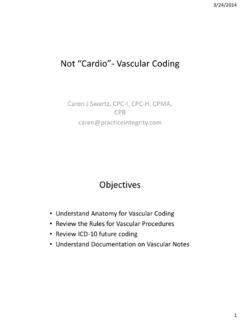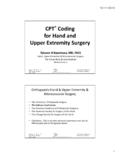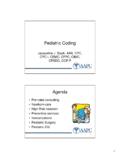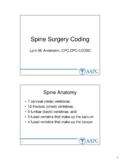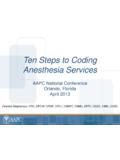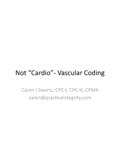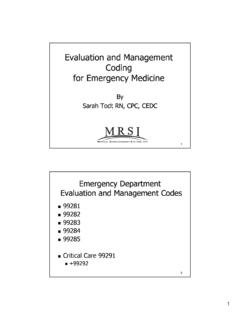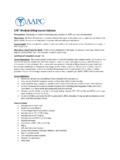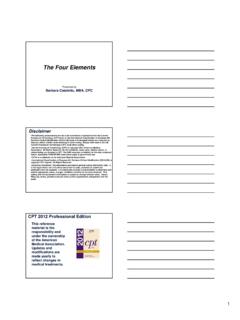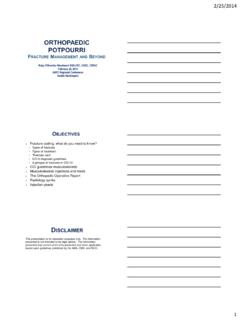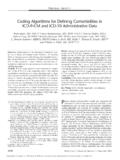Transcription of ICD-10-CM Coding for Mental and Behavioral Disorders
1 9/13/2013 1 ICD-10-CM Coding for Mental and Behavioral Disorders ICD-10-CM Coding for Mental and Behavioral Disorders Shelly Cronin, Director ICD-10 Training ICD-10-CM Coding for Mental and Behavioral Disorders No part of this presentation may be reproduced or transmitted in any form or by any means (graphically, electronically, or mechanically, including photocopying, recording, or taping) without the expressed written permission of AAPC. ICD-10-CM Coding for Mental and Behavioral Disorders AGENDA Documentation Concepts Use, Abuse, and Dependence Depression Bipolar Disorder Pervasive Developmental Disorders Behavioral and Emotional Disorders with Onset Usually Occurring in Childhood and Adolescence 9/13/2013 2 ICD-10-CM Coding for Mental and Behavioral Disorders Approximately 21 unique concepts Breaking down ICD-10-CM into concepts Concepts for Mental and Behavioral Disorders include.
2 Documentation Concepts Concepts include Type Caused by/Contributing factors Associated with Episode Concepts include Severity Temporal Factors ICD-10-CM Coding for Mental and Behavioral Disorders Type A description of the condition that is typically considered a type Type 1 Diabetes or Pathological fracture Temporal Factors A concept that is related to some time parameter associated with a condition Acute, Chronic, Paroxysmal, Recurrent Caused by/Contributing Factors A concept that relates the cause of a condition to another condition Drugs, alcohol, physical disease Documentation Concepts ICD-10-CM Coding for Mental and Behavioral Disorders Associated with A description of the condition that is typically considered a associated Intoxication, speech impediment, psychotic features Episode A concept that is related to the status of a condition In remission verses not Severity A concept that specifies the acuity of the condition Mild, moderate, severe Documentation Concepts 9/13/2013 3 ICD-10-CM Coding for Mental and Behavioral Disorders Use, abuse, and dependence Codes located in categories F10-F19 3rd character indicates substance used 4th and 5th characters indicate the psychopathological syndrome Examples.
3 Alcohol dependence with withdrawal Cannabis abuse with intoxication ICD-10-CM Coding for Mental and Behavioral Disorders Use, abuse, and dependence Hierarchy If both use and abuse are documented, code only abuse If both abuse and dependence are documented, code only dependence If both use and dependence are documented, code only dependence If use, abuse and dependence are all documented, code only dependence ICD-10-CM Coding for Mental and Behavioral Disorders Examples Patient presents to the office and the family practitioner documents alcohol use and abuse in the assessment. Alcohol abuse, uncomplicated Patient presents to the office with uncomplicated alcohol dependence and cocaine abuse with cocaine-induced anxiety disorder.
4 Alcohol dependence, uncomplicated Cocaine abuse with cocaine-induced anxiety disorder 9/13/2013 4 ICD-10-CM Coding for Mental and Behavioral Disorders Alcohol use, abuse, and dependence The codes for alcohol use, abuse, and dependence are found in the following subcategories: Alcohol abuse Alcohol dependence Alcohol use, unspecified ICD-10-CM Coding for Mental and Behavioral Disorders Alcohol use, abuse, and dependence The codes are further broken down into the following: Uncomplicated With intoxication With withdrawal With alcohol-induced psychotic disorder With alcohol-induced persisting amnestic disorder With alcohol-induced persisting dementia With other alcohol-induced disorder With unspecified alcohol-induced disorder ICD-10-CM Coding for Mental and Behavioral Disorders Example Patient presents for visit stating he is having issues with alcohol.
5 He says that in the past 6 months, his drinking has increased markedly. He states that he needs to drink twice as much to get buzzed . He states that he thinks about drinking more often and desires alcohol most times of the day. He has missed family gatherings and a few appointments due to being inebriated. He has come for help as he has tried to quit on his own and has not been successful. Alcohol dependence, uncomplicated 9/13/2013 5 ICD-10-CM Coding for Mental and Behavioral Disorders Nicotine use and dependence Nicotine dependence is broken down by: Tobacco product Cigarettes ( ) Chewing tobacco ( ) Other tobacco product ( ) ICD-10-CM Coding for Mental and Behavioral Disorders Nicotine use and dependence The category is further broken down by complication: Uncomplicated In remission With withdrawal With other nicotine-induced disorder With unspecified nicotine-induced disorder ICD-10-CM Coding for Mental and Behavioral Disorders Nicotine use and dependence Additional codes relating to nicotine in ICD-10-CM include.
6 , Tobacco use , History of tobacco dependence , Exposure to environmental tobacco smoke , Occupational exposure to environmental tobacco smoke , Exposure to tobacco smoke in the perinatal period , Tobacco use (smoking) during pregnancy, childbirth, and the puerperium 9/13/2013 6 ICD-10-CM Coding for Mental and Behavioral Disorders Example Patient presents requesting a nicotine patch to assist her to stop smoking. She has been smoking for 12 years with a pack and half of cigarettes per day habit. She quit a week ago and is experiencing withdrawal symptoms of agitation, sleeplessness, and nervousness. Nicotine dependence, cigarettes, with withdrawal ICD-10-CM Coding for Mental and Behavioral Disorders Example Patient comes in for asthma check-up.
7 She has mild persistent asthma and a history of cigarette smoking. She quit smoking five years ago. Mild persistent asthma, uncomplicated History of tobacco dependence ICD-10-CM Coding for Mental and Behavioral Disorders Depression CDC estimates 5% of Americans older than age 11 may have depression. It is a disorder of the brain. It usually starts between the ages of 15 and 30. More common in women 9/13/2013 7 ICD-10-CM Coding for Mental and Behavioral Disorders Depression In ICD-10-CM depression is classified by the following: Episode Single or Recurrent Severity Mild, Moderate, Severe With or Without psychotic features Remission status Partial or Full ICD-10-CM Coding for Mental and Behavioral Disorders Example Vera, a 38-year-old single woman presents to her primary care physician with symptoms of depression for the past year.
8 These include feelings of sadness, anhedonia, significant loss of energy, psychomotor retardation, and difficulty sleeping. She denies any significant medical issues and states her symptoms began when her relationship of 8 years ended. Patient scored a 24 on the Beck Depression Inventory (BDI), supporting a diagnosis of major depressive disorder, single episode, moderate. Major depressive disorder, single episode, moderate ICD-10-CM Coding for Mental and Behavioral Disorders Bipolar disorder Most commonly diagnosed in persons between the ages of 18 and 24 Patients suffer dramatic mood swings from mania to depression 9/13/2013 8 ICD-10-CM Coding for Mental and Behavioral Disorders Bipolar disorder In ICD-10-CM bipolar disorder is classified by the following parameters.
9 Type- Type I or Type II Current episode - Hypomanic, Manic, Depressed, Mixed Severity - Mild, Moderate, Severe With or without psychotic features Remission status - partial or full ICD-10-CM Coding for Mental and Behavioral Disorders Example Julie presents today for a check-up on her bipolar disorder. She states that she has recently begun feeling depressed, not wanting to get out of bed, not showering, etc. She says she wanted to come in to "nip it in the bud". Patient admits to being noncompliant with taking her Lithium and Seroquel recently, which may have set off this mild depression. She states that she does not like to be dependent on it. Discussed the importance of taking medications properly and on time.
10 We will increase her Seroquel for a short period and have the patient return in 1 week. Patient informed to contact our office immediately or present to the ED if she has thoughts of harming herself. Plan reviewed with her mother who will ensure patient takes her medication. ICD-10-CM Coding for Mental and Behavioral Disorders Answer disorder, current episode depressed, mild Patient's intentional underdosing of medication regimen for other reason 9/13/2013 9 ICD-10-CM Coding for Mental and Behavioral Disorders Pervasive developmental Disorders Pervasive developmental Disorders (PDDs), refers to a group of conditions that involve delays in the development of many basic skills, including.
